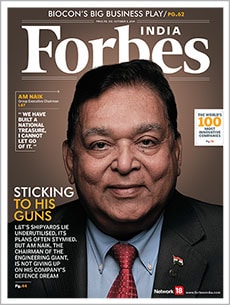
L&T's Defence Dilemma
Controversies, cancelled orders and general inaction have meant that India is today the world's largest arms importer
Amid hopes that the new National Democratic Alliance government at the Centre will bring the growth momentum back in the economy, the Indian corporate sector is keenly watching one area: Defence. Over the past several years, despite policy pronouncements about the need for Indian companies to have a greater role in manufacturing much-needed defence equipment, little has moved. Controversies, cancelled orders and general inaction have meant that India is today the world’s largest arms importer, and needs to spend an estimated $250 billion over the next 10 years to modernise its rickety defence equipment if it is to try and catch up with the might of China.

The new government has made the right noises, increasing defence spending and allowing greater foreign investment into the sector. But for companies which have been waiting for some movement for years, this is just a sliver of hope. Much more needs to be done if India has to truly live up to the promise of indigenising defence technology. India Inc heavyweights, among them Larsen & Toubro, the Tata Group, Mahindra, the Godrej Group and Bharat Forge, have been waiting to get a larger slice of the defence business as the prospect of indigenisation makes them invest heavily in such capabilities.
As L&T’s iconic chairman AM Naik, who has been pushing for greater indigenisation in defence, tells Forbes India’s Cuckoo Paul in our cover story, the company looks at its defence capabilities as a “national treasure”. But the pace of policy implementation by the government has been painfully slow even as L&T has invested large amounts to bolster capabilities in making warships and submarines, radars, weapon launchers, combat vehicles and unmanned aerial vehicles, among other things. In the meantime, the company has lost Rs 900 crore in the ship-building business alone, and losses are piling up in other areas. L&T’s is just one example of the price Indian companies are paying for delays in policy execution. A lot now depends on the Narendra Modi government which will have to remove the cobwebs and move swiftly to capitalise on the work done by Indian companies in the defence sector.
L&T also features in another package I invite readers to dig into: The Forbes listing of The World’s 100 Most Innovative Companies, based on the concept of Innovation Premium, which is the difference between a firm’s enterprise value and net present value of cash flows from its existing businesses. L&T ranks 58th while Hindustan Unilever (14), Tata Consultancy Services (57), Sun Pharma (65) and Bajaj Auto (96) are the other Indian companies on the list.
Best,
Sourav Majumdar
Editor, Forbes India
Email:sourav.majumdar@network18publishing.com
Twitter id:@TheSouravM
(This story appears in the 30 November, -0001 issue of Forbes India. To visit our Archives, click here.)





